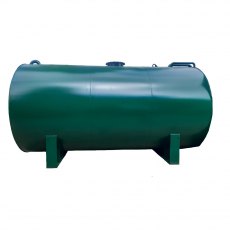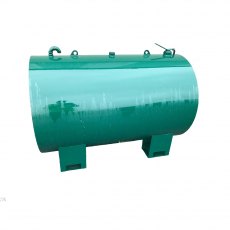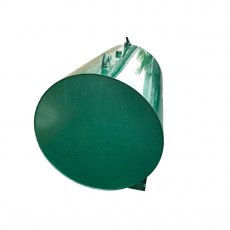Single Skin Steel Tanks FAQs
How secure are the diesel dispensing tanks?
All the diesel dispensing tanks that we sell are bunded which is a term that literally means a `tank within a tank'. This is designed to keep the fuel safe in the very rare event should the inner tank split. The cabinet doors can be locked either with a key or in some instances the tank is supplied with a metal post which the customer can secure with their own padlock
Advanced diesel dispensing tanks can sometimes be offered or come with fuel management systems which would only allow authorized people with key fobs to dispense fuel
What liquids are diesel dispensing tanks suitable for storing and dispensing?
Diesel (D) to British Standard BS2869. Additionally, the diesel dispensing tanks we sell are also suitable for the storage and dispensing of Bio-Diesel with a bio-element of up to 5% concentration.
Can I store and dispense Kerosene (C1/C2) from a diesel dispensing tank?
No. The pumps and ancillary equipment fitted to these products are suitable only for use with Diesel. Dispensing a non-approved fuel from this equipment could result in serious injury or death.
Are the flow meters fitted (if fitted as standard or as an upgrade) to diesel dispensing tanks suitable for the resale of fuel?
No. Any equipment that is required to be sold would require a Weights & Measures certificate. All the diesel dispensing tanks we sell do not have certified equipment
Are batteries supplied as standard with 12v equipped pumps on the diesel dispensing tanks?
No. The 12v pumps would come supplied with battery cables and crocodile clips to connect to a battery outside of the tank. We are unable to provide batteries.
Are diesel dispensing tanks suitable for dispensing 'Adblue'?
No. These tanks would not have the correct type of pump and AdBlue solution requires stainless steel connectors which are not used in diesel tanks
What are the advantages of steel diesel tanks?
Choosing a steel tank has a nu,mber of advantages:-
- Durable and long life - A steel tank is strong and hard wearing and requires very little maintenance. Damage to a steel tank can be easily repaired, whereas a plastic tank is often unusable once damaged.
- Robust - steel tanksa re very hard to damage and therefore not as easy to leak, causing environmental problems.
- Secure - Steel tanks are harder to break in to and are less likely to be damaged with vandalism.
- Customised - steel tanks can be made and customised to suit not only the shape and capacity you need but also the dispensing equipment that is installed.
How long will a steel tank last?
The minimum that manufacturers aim for is 10 years of use for steel tanks. The surrounding enviroment also affects the longevity of a steel tank and the coating on the tank, corroding more quickly in a coastal environment etc.
How long does diesel last in a transfer tank?
The answer to this question depends on several factors, including the quality of the diesel, the environment the tank is stored in, and the type of transfer tank being used. Generally speaking, diesel fuel stored in a transfer tank will last between six and twelve months. However, this time frame can vary depending on the factors listed previously. For example, if the diesel is of high quality and stored in an environment that is not prone to extreme climate changes, then the diesel may last up to twelve months. However, if the diesel is of lower quality and stored in a harsh environment, then it may only last for six months. Additionally, if the tank is not properly sealed, then the diesel may not last as long, as air can contaminate the fuel and cause it to deteriorate more quickly.
When it comes to selecting the right type of transfer tank for your diesel storage needs, we have several options available. Each type of tank will have its own pros and cons, and the best option for you will depend on your unique needs and budget. If you’d like any help choosing the right diesel transfer tank, contact our friendly team who will be happy to help.
Can I store diesel in a transportable tank?
A transportable diesel tank should be stored in a secondary containment area if it contains fuel as in most cases these are single skin.
These tanks are primarily designed for transporting fuel to a place of work to be completely discharged of fuel
Can I have a flow meter on my diesel tank if fitted with a hand pump or if gravity fed?
No. Unfortunately the pressure required to enable the flow meter to read accurately is not at a tolerance that the flow meter can record.
Why can't I have an automatic shut off nozzle on my diesel tank if fitted with a hand pump or if gravity fed?
Unfortunately the automatic nozzle requires a pressure of the fuel being pumped to operate the shut off mechanism.
A hand pump or gravity fed tank would not have the necessary pressure to enable this
Do you sell gravity feed kits for the delivery of diesel fuel?
No, as an environmentally responsible supplier we do not supply these kits, due to the high risk of accidental damage / discharge associated with their use. Additionally, at many installations today their continued use is illegal. If you require a tank to store diesel fuel for vehicular use, we would advise you consider a Harlequin Fuel Station, or Fuel Point For BioDiesel applications, Harlequin BioFuel Stations are recommended for BioDiesel blends of up to B100. Alternatively, for connection to remote pedestal type dispensing units, Harlequin's BioBund range is ideal. Please note that all BioDiesel tanks supplied by Tanks.ie are suitable only for use with BioDiesel produced in accordance with European Standards.
What are the power requirements for mains powered diesel dispensing tanks?
A single phase (domestic 240v mains) power supply is required and always recommended being connected to a Residual Current Device (RCD) fitted at the connection point to the power supply. All mains electrical installations must only be undertaken by a qualified electrician and must be inspected and tested regularly in accordance with statutory requirements. Alternatively an electrician can wire up to a standard 3 pin plug and would not affect warranty.

 Login
Login


